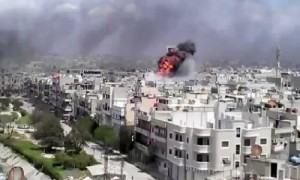Eighteen Seconds

Life in Douma under the bombs
By Basem Ameen
As usual, the minibus stopped at Al-Jarra checkpoint, one of the many located at the entrances to Douma, in the countryside surrounding Damascus.
 While I was glancing at the slogans sprayed on walls and armoured vehicles, one neatly-painted phrase caught my attention – “Baba Amr will grieve for you, Douma.” This seemed like a warning that Douma would suffer even worse devastation than was inflicted on the Baba Amr district of Homs. We have grown accustomed to this sort of thing, a device the regime uses to trying to reestablish its power to inspire fear.
While I was glancing at the slogans sprayed on walls and armoured vehicles, one neatly-painted phrase caught my attention – “Baba Amr will grieve for you, Douma.” This seemed like a warning that Douma would suffer even worse devastation than was inflicted on the Baba Amr district of Homs. We have grown accustomed to this sort of thing, a device the regime uses to trying to reestablish its power to inspire fear.
Our vehicle went on its way, leaving the slogan behind. When we got to Douma, I discovered that other people had read this phrase, too. But I was surprised to find that its effect was the opposite of what was intended. Instead of being scared, people were taking pride in standing up to the regime.
As the revolution took on a militarised form, Douma began to witness clashes between government and opposition forces that left hundreds dead in a matter of days and took a heavy toll on people’s daily lives.
The shelling has become more intense, and people have taken up a new routine that divides the day into segments 18 seconds long. That is the time that separates the firing of an artillery piece and the impact of the shell.
Bombarded by hundreds of shells a day, Douma suffers hundreds of casualties at the 18th second of each of these segments of time.
I often wonder how a martyr has spent his final 18 seconds. He might have written a will, said his prayers, counted down the seconds, or remembered his wife and children, or his lover. He might have run for a room that offered shelter or to a lower floor; or he might have done what my father does – stand at the window to make sure I have got inside safely.
During these seconds, you wish you could escape from yourself. When an artillery shell misses you and lands on one of your neighbours’ homes, you have a chance to check on casualties before the next 18-second adrenaline rush kicks in.
By the 18th second, an elderly person, child or woman may be dead, the tragedy even worse if both a mother and child are killed. A house may collapse and the trees around it die.
As you wait for it, all you can do is count the seconds. If it misses, you get an extra 18 seconds in this game of death. You become delusional, so that death seems merely an idea, a customary thing.
When it happens next, I will think of that slogan I read and wonder, “Have you grieved for us, Baba Amr?”
In Douma, you have to keep your courage on show at all times. But the time comes when you can no longer hide the fact that it is exhausting to keep on waiting.
This time, a shell missed us by a matter of metres. As the bombardment had grown more intense, all the residents of the building I was in decided to take shelter on the lower floors. Despite the large number of people, the only sounds breaking the silence were the pounding of artillery shells and children screaming. You could see parents’ anxiety as their terrified children ran into their arms every 18 seconds.
As long as those 18 seconds last, you have to stay calm in front of the women and children, and terrified male neighbours, too – concealing your own fear all the while. If the clocks started chiming every 18 seconds, you wouldn’t be surprised.
At night, it was all dark and quiet, but it still was comforting to hear someone shouting out “Allahu akbar” – “God is great” – every 18 seconds. Then I knew that the shell had missed my neighbour’s house and that he was still alive.
